How top caterers on the East and West coasts realized the need to gut the past to make room for the future (not to mention cold blasters)
By Liese Gardner
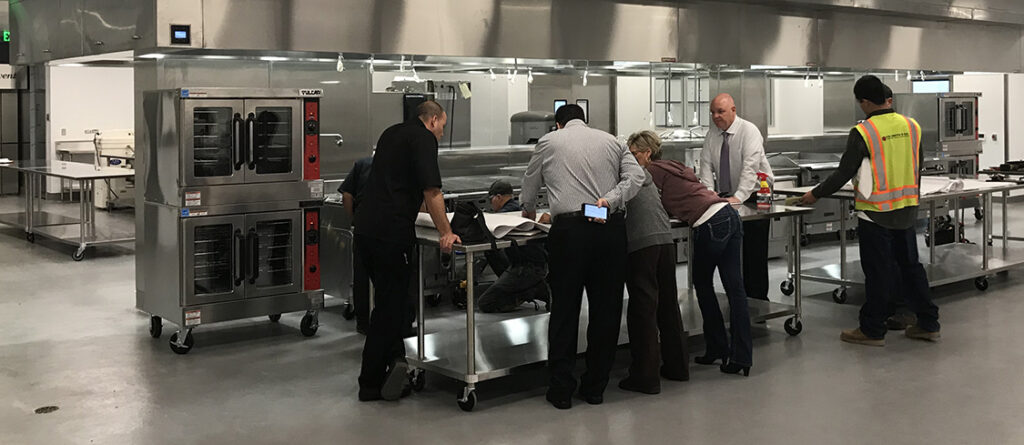
Picture this…you’re envisioning the future of your business over the next five years. It’s brimming with exciting possibilities—increased client satisfaction, large-scale events, a cohesive team, fruitful brand collaborations and even a kitchen renovation. Screech! All was going well until that last one.
While a kitchen renovation may be high on the wish list, it often gets relegated to the backburner due to cost, disruption and the time you know it will take. And yet, it’s often a major key to growth.
Consider the stories of Ridgewells Catering in Washington, D.C., and 24 Carrots Catering & Events in Costa Mesa, California, two of the largest caterers in the country. The first stands on the precipice of a significant renovation. The latter has been basking in the success of its extensive renovation since 2018. Both owners understand that while kitchen rehauls present many challenges, the investment will pay off for years to come.
And So It Begins
The beginning stages of any renovation are much the same. The plans percolate in your dreams, then come alive in discussions with the kitchen team. They’re set down on paper, and—finally—details are drawn up in the offices of architects, lawyers and city planners. All before one nail has been hammered.
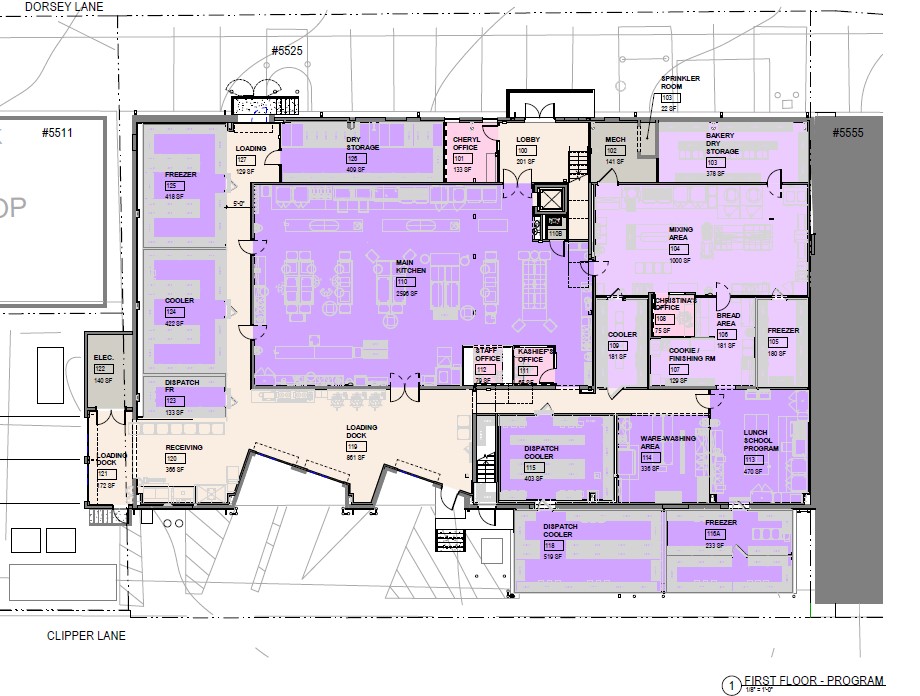
That’s where Susan Lacz is now. Lacz is owner of Ridgewells, one of the largest privately held catering firms in the United States.
Founded as a family business in 1928, Ridgewells Catering made a name for itself early on, providing catering services to more than 18 presidential inaugurations, and boasting a client list that includes the Pentagon, Fortune 500 companies, educational institutions, world leaders and thousands of Washingtonians.
Ridgewells has expanded to include a Major Events division, through which it has catered more than 29 U.S. Open Men’s Golf Championships, three U.S. Women’s Open Golf Championships, three Super Bowls, the AT&T Golf Tournament and more. In the 1990s, it created a program for lunch services to private schools and corporations, and in 2001, established Haute Catering by Ridgewells, exclusively providing all food and logistics for catered events and meetings at the U.S. House of Representatives and other agencies requiring union staffing. In 2009, it launched Purple Tie by Ridgewells, a hospitality staffing agency.
That’s a lot of gourmet food to be prepared and delivered! Especially when you consider that this extensive portfolio of clients and events, coupled with venue operations, has been managed within limited kitchen space.
Starting From Scratch
Situated in an area zoned for light industrial but nestled in a high-end residential zone in Bethesda, Maryland, Ridgewells faced spatial constraints. Recognizing the need for an upgrade, Lacz personally acquired the company’s property with a partner in 2019 and oversaw a comprehensive renovation of the offices. Stripping everything down to the two-by-fours, the reconstruction incorporated state-of-the-art electrical, HVAC, a tasting room and modern design elements.
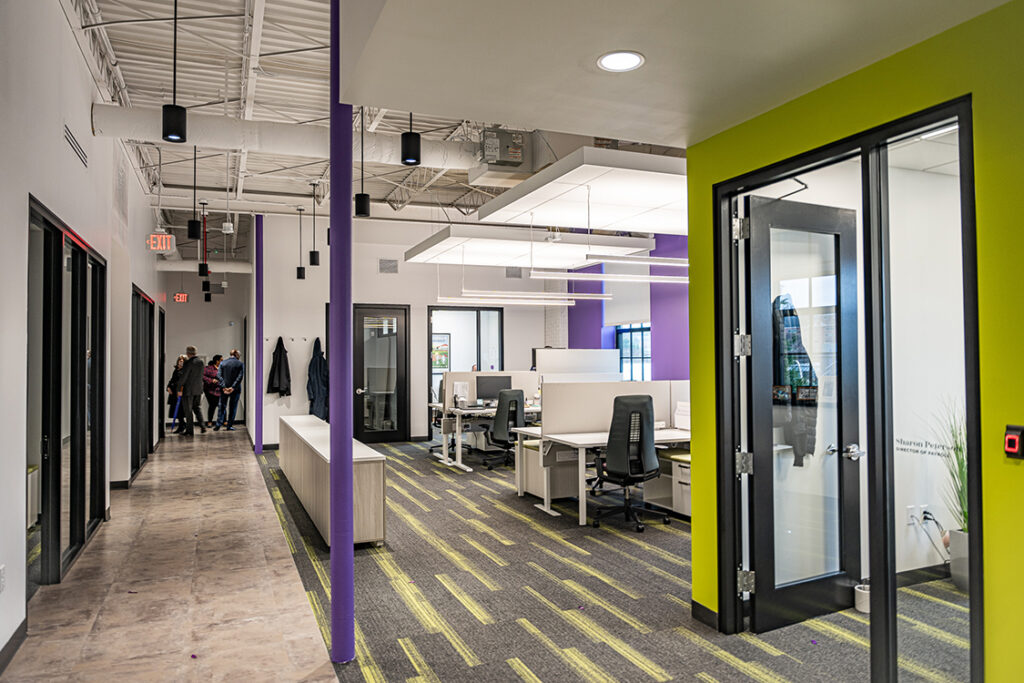
The renovated space now boasts expansive glass features and cutting-edge technology. The 9,000-square-foot office space, once comprised of seven separate buildings, emerged from the remnants of the old laundry, linen room and office spaces. Predominantly white with accent walls in lime green and Ridgewells purple, it now has the appearance of a headquarters belonging to a high-tech company.
Lacz notes a significant advantage of the renovation: the ability to attract top talent and media to their offices. The upgrade has transformed not only the physical workspace but also the perception of Ridgewells as an innovative business.
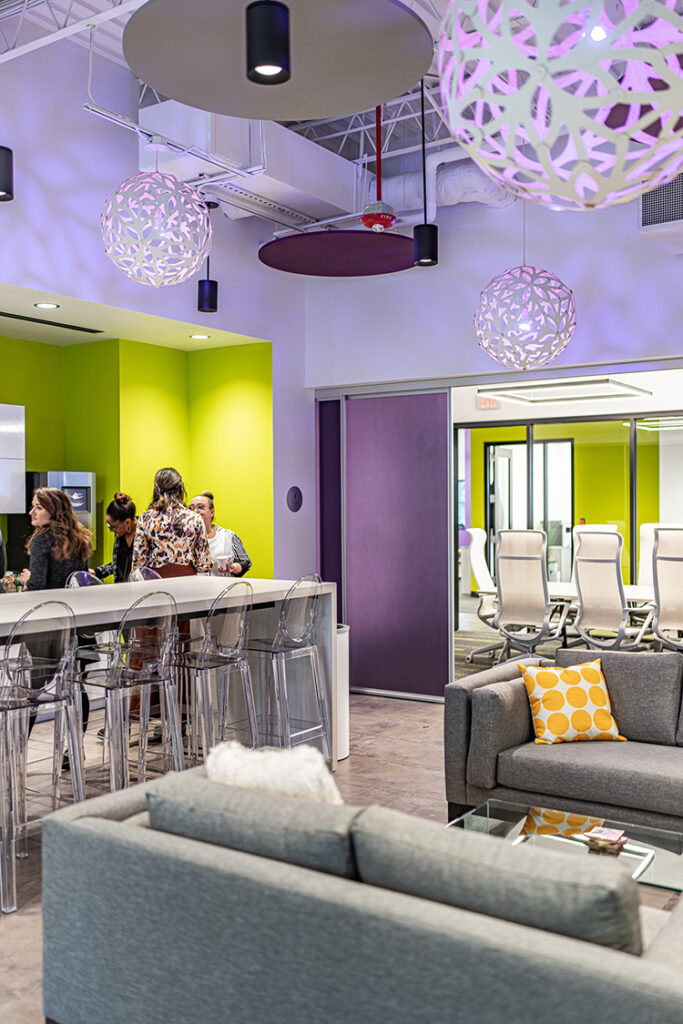
Emboldened, Lacz turned her attention to the kitchen. All the drawings had been made for a new 12,000-square-foot kitchen with all the fixings—a designated sandwich and school lunch area, a bakery, storage, dishwashing, blast chillers and more. The team had consulted with Savoy Brown Food Service Consultation on flow and new equipment. “I have a beautiful kitchen layout ready to go,” Lacz says. Plus, there were plans to build up, adding two stories for a separate warehouse and outdoor space.
“We were getting ready to break ground when the architect said, ‘You know, I think it might be better if we tear it down,’” Lacz says. It was the equivalent of a cold shower, but no doubt a smart move and, in the long run, more cost-effective. Lacz hopes to break ground on the new building this year.
Changes, stops, starts and pivots are all part of a renovation, and her experience with the main office building has given Lacz the construction savvy necessary to rethink and retool. She also remains inspired by other caterers’ projects.
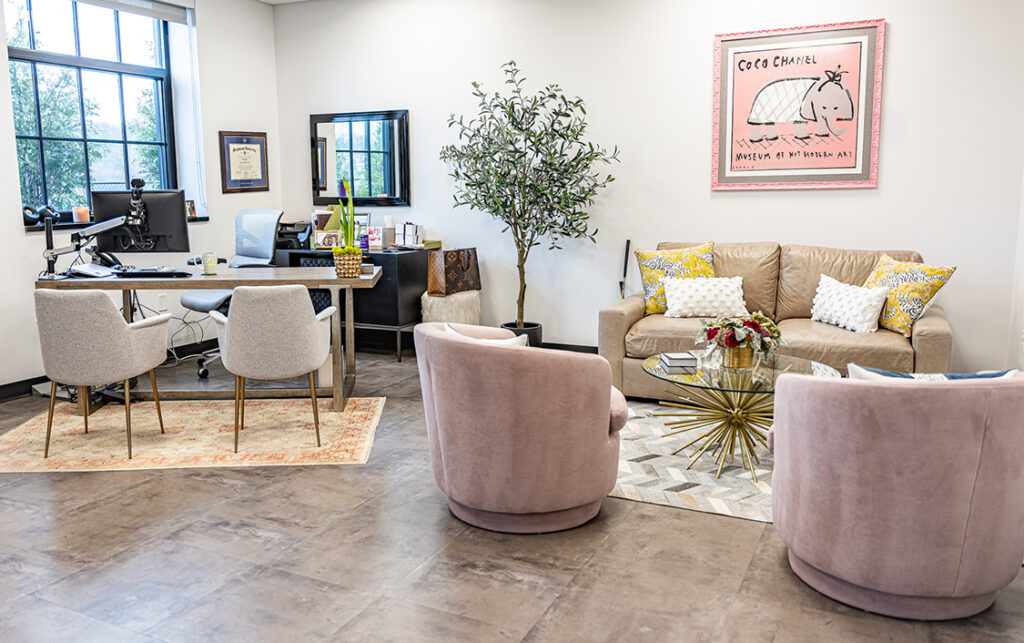
“When I got ready to create plans for our kitchen, I started by visiting several industry colleagues and other members of Elite Catering + Event Planning, such as 24 Carrots and M Culinary,” says Lacz. “They all have different footprints than we do, but I got great takeaways from them all. At 24 Carrots, I was impressed by the efficient kitchen layout and really loved their gorgeous tasting rooms. They set that all-important tone of luxury and service.”
Creating Solutions in a New Space
Norm Bennett, the founder of 24 Carrots, built the company’s current kitchen based on first-hand experience. A former chef, he mapped out the entire building to cater to the evolving needs of the business.
Founded in 2004, 24 Carrots moved to a new location in 2009. By 2016, however, sales were soaring, signaling the need for an even larger space and a new chapter. So, the company acquired a 40,000-square-foot property and embarked on a comprehensive renovation project, completely transforming the space from the ground up. The ambitious undertaking was completed in 2017, and by November of that year, the company had seamlessly transitioned into its new headquarters.
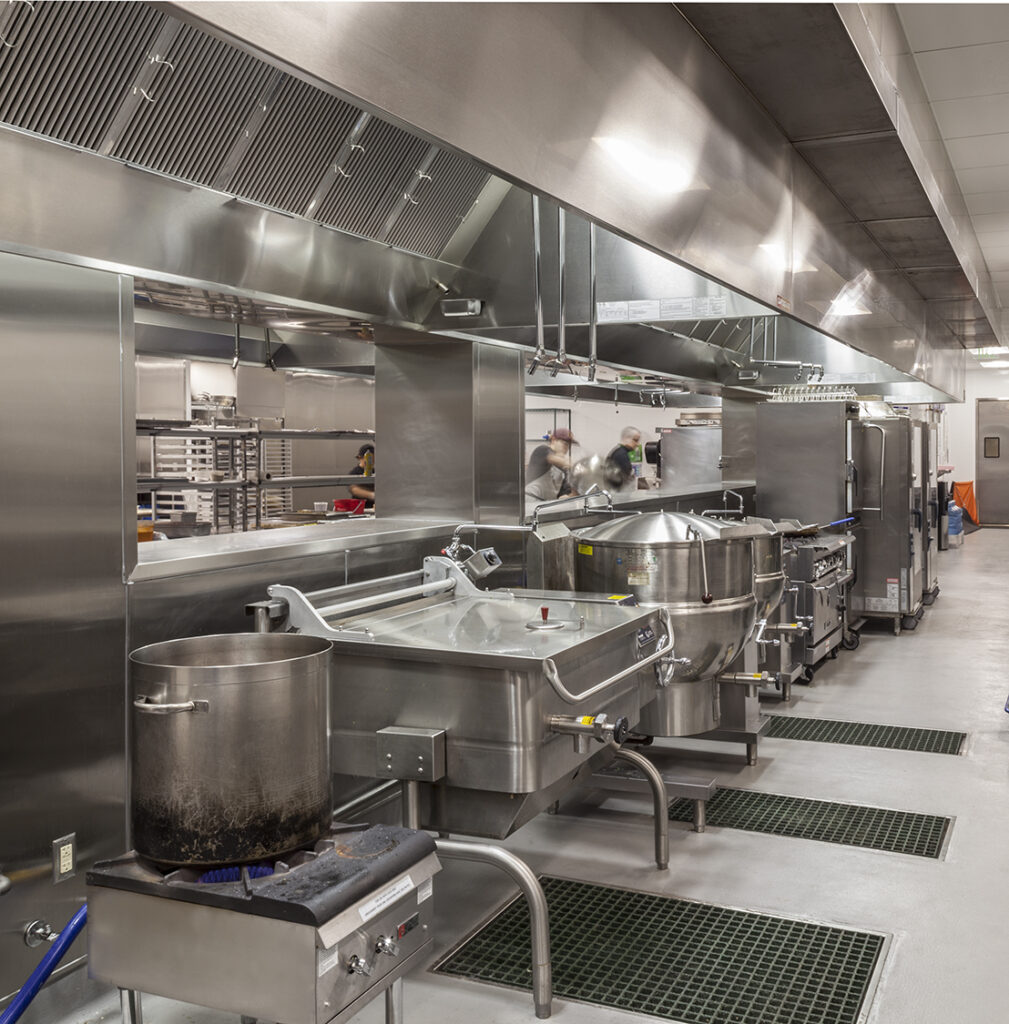
Before construction, Bennett, along with CEO Laura Fabian and key members of the leadership team, collaborated with building architects, ensuring that every aspect of the new space was not just an upgrade but a solution to past limitations. “Everything that didn’t work in the old space, we changed in the new one,” he says.
Although clients will rarely see most of the 12,000- square-foot, state-of-the-art kitchen, there are two spaces within the kitchen area they will experience—the tasting rooms, which have proven to be an unexpected cornerstone of 24 Carrots’ remarkable success within the Southern California event market, setting the company apart from its competition.
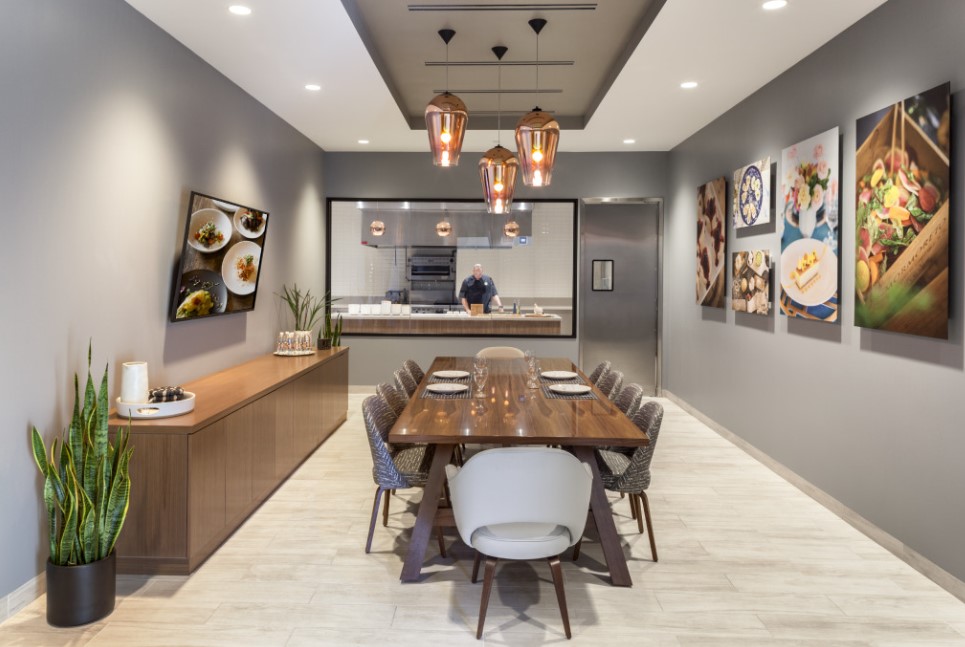
24 Carrots conducts more than 600 tastings a year in its two tasting rooms.
The two tasting rooms are beautifully appointed and feature a large chef’s table window into the kitchen. Copper pendant lights adorn both the tasting room and the pristine kitchen. In this stylish setting, guests sit comfortably at a long table for their private tasting. Hanging on the walls are photos of the company’s creative approach to cuisine and a plasma screen to customize the presentations.
“When we started, other catering firms were doing quarterly tastings for 10 couples, or 20 people,” says Bennett. “We wanted to do them individually for each couple. As soon as we started doing that, we got very busy. We now do 20 to 30 events a weekend and over 600 tastings a year.”
This translates to an impressive six tastings daily, four days a week, between the two dedicated tasting rooms. The tastings are staggered, with a dedicated staff assigned to each room. This strategy has been a game-changer for the company.
Building a Masterpiece
The scope of 24 Carrots’ extensive culinary operations demanded nothing short of a kitchen masterpiece. The design prioritizes efficient flow and cutting-edge equipment—a necessity for the company’s constant influx and outflow of food destined for various venues. 24 Carrots owns and operates five venues in Orange County and is preferred or exclusive at another 31 throughout Southern California.
A key feature of the kitchen layout is its streamlined process. Everything enters through one door and exits through another situated in a refrigerated section, which serves as the quality-control checkpoint for all outgoing items. Additionally, a third incoming-only door facilitates after-hours access, enabling staff to return with food and equipment after events without disrupting the main building.
The kitchen is strategically divided, featuring a separate cold kitchen with enhanced insulation and three refrigerators within the room. Connected to a walk-in, this area can essentially transform into a 2,000-square-foot refrigerator. A dedicated pastry department boasts its own freezer, baking oven and a built-in double proofer. To facilitate diverse cooking processes, movable full-size combi Alto-Shaam ovens are employed, complemented by a blast chiller that accelerates the cooling process—crucial for compliance with health department standards.
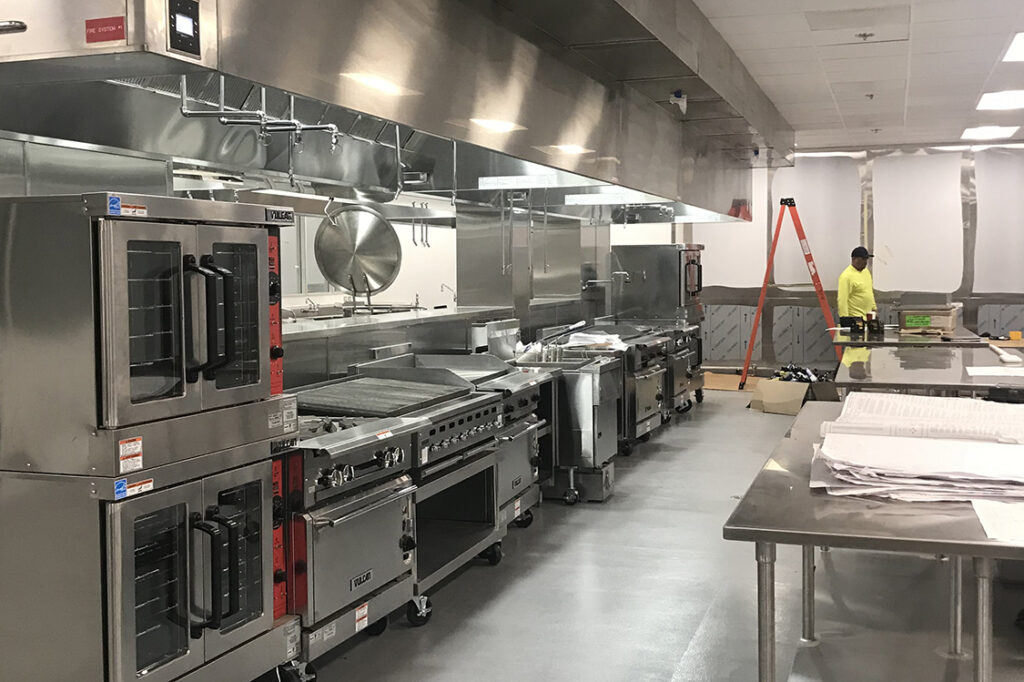
Among the specialized equipment are large Swiss braisers and steam kettles, adding versatility to the culinary arsenal. The kitchen also houses standard equipment such as grills, fryers and convection ovens, ensuring a well-equipped space to handle the daily demands of producing a substantial volume of high-quality food.
With this much firepower in the kitchen, Bennett estimates that 24 Carrots is on track to have even more substantial growth this year and beyond.
Both Ridgewells and 24 Carrots recognize the pivotal role of a well-equipped and strategically designed kitchen, and have committed the time, energy and financial resources necessary to achieve it. While they’re strategically investing to maintain their stellar reputations, they’re setting the stage for future expansion and success.
For More Information
24 Carrots Catering & Events 24carrots.com
Ridgewells Catering ridgewells.com
ABOUT THE AUTHOR
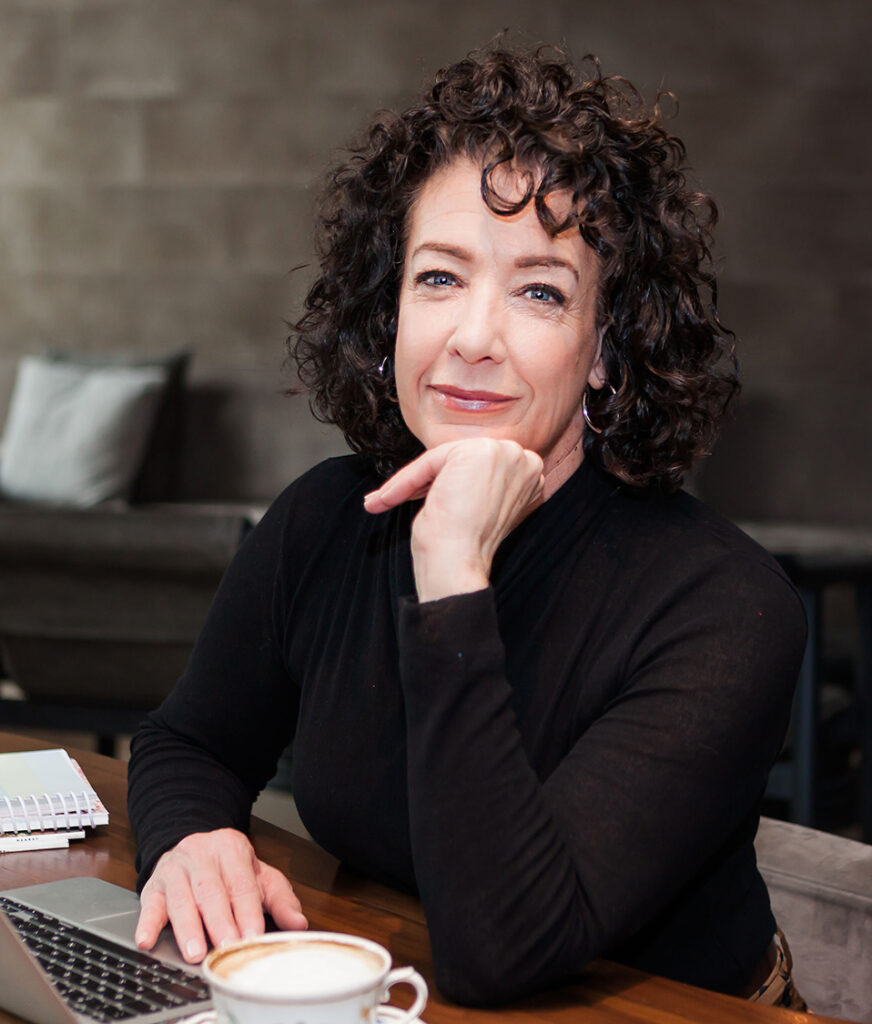
Liese Gardner began her journey in the catering and event world as editor of Special Events magazine and director of education for The Special Event. Now owner of Liese Gardner Communications, she continues to write about the industry and connect event professionals with their ideal clients through Brand Therapy, her own style of marketing and legacy building. For more information, visit liesegardner.com.










